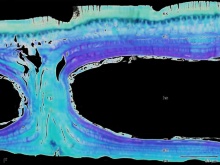The ICD ITKE research pavilion project provides the opportunity to work on a project integrated bachelorthesis. The specific scope of work for the thesis will be defined beforehand in conjunction with the staff. Submission date is the 8th of July 2013.
The project focuses on the design and construction of a research pavilion situated on the plaza between the university buildings K1 and K2 and explores a specific construction principle which references biological precedents and was developed in the context of the previous "Performative Morphology III" studio and in cooperation with the biology department at the University of Tübingen. The precedent, elytra, which forms the exoskeletal layer protecting beetle wings, consists of a multi-layered structural shell. Variations in the helical fibre-matrix connecting the layers results in varying material properties corresponding to multiple structural and functional requirements. The translation of the biological example into a technological prototype, i.e. the application of multilayered, geometrically differentiated fibre-composite structures into a research pavilion will be the main challenge of the studio. More specifically, this entails geometric differentiation and adaptability within the context of material optimization and parametric modeling as well as the integration of parameters of robotic control and fabrication.
In a first stage of the project, a team consisting of students and research associates will develop a digital information model integrating design geometry with fabrication constraints and material parameters. In a feedback process, results from structural analysis and physical load testing will inform the digital model. As part of a corequisite seminar, students will familiarize themselves with the use of robotic fabrication technologies and augmentation the informational model.
The project will provide the students with the opportunity to apply computer-aided design and fabrication methodologies in an integrated manner to a real-world project. The completion of the project including design development, documentation, fabrication and assembly of the design within the course of one semester will require stamina and commitment. The studio and seminar are corequisites in order to provide the students with the necessary time and space within the semester.


